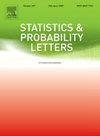Chainability of infinitely divisible measures
IF 0.9
4区 数学
Q3 STATISTICS & PROBABILITY
引用次数: 0
Abstract
Let be a positive measure on with Laplace transform defined on a set whose interior is nonempty and let be its cumulant transform. Then is infinitely divisible iff is a Laplace transform of some positive measure . If also is infinitely divisible, then is a Laplace transform of some positive measure and so forth, until we reach a such that is not infinitely divisible. If such a does not exist, we say that is infinitely chainable. We say that is infinitely chainable of order if it is infinitely chainable and is the smallest for which In this note, we prove that is infinitely chainable order iff falls into one of three classes: the gamma, hyperbolic, or negative binomial classes, a somewhat surprising result.
无限可分度量的可链性
设 ρ0 是 R 上的正量度,其拉普拉斯变换 Lρ0(θ) 定义在一个内部 Θ(ρ0) 非空的集合上,并设 kρ0=logLρ0 为其累积变换。如果 kρ0′′ 是某个正量度 ρ1 的拉普拉斯变换,那么 ρ0 是无限可分的。如果 ρ1 也是无限可分的,那么 kρ1′′ 就是某个正量度 ρ2 的拉普拉斯变换,以此类推,直到我们找到一个 k,使得 ρk 不是无限可分的。如果这样的 k 不存在,我们就说ρ0 是无限可链的。如果 ρ0 是无限可链的,并且 k0 是 ρk=ρk+1 的最小 k,那么我们说 ρ0 是阶 k0 的无限可链。在本论文中,我们将证明,如果 ρk0 属于伽玛类、双曲类或负二项式类中的一类,则 ρ0 是阶 k0 的无限可链式,这是一个有点令人惊讶的结果。
本文章由计算机程序翻译,如有差异,请以英文原文为准。
求助全文
约1分钟内获得全文
求助全文
来源期刊

Statistics & Probability Letters
数学-统计学与概率论
CiteScore
1.60
自引率
0.00%
发文量
173
审稿时长
6 months
期刊介绍:
Statistics & Probability Letters adopts a novel and highly innovative approach to the publication of research findings in statistics and probability. It features concise articles, rapid publication and broad coverage of the statistics and probability literature.
Statistics & Probability Letters is a refereed journal. Articles will be limited to six journal pages (13 double-space typed pages) including references and figures. Apart from the six-page limitation, originality, quality and clarity will be the criteria for choosing the material to be published in Statistics & Probability Letters. Every attempt will be made to provide the first review of a submitted manuscript within three months of submission.
The proliferation of literature and long publication delays have made it difficult for researchers and practitioners to keep up with new developments outside of, or even within, their specialization. The aim of Statistics & Probability Letters is to help to alleviate this problem. Concise communications (letters) allow readers to quickly and easily digest large amounts of material and to stay up-to-date with developments in all areas of statistics and probability.
The mainstream of Letters will focus on new statistical methods, theoretical results, and innovative applications of statistics and probability to other scientific disciplines. Key results and central ideas must be presented in a clear and concise manner. These results may be part of a larger study that the author will submit at a later time as a full length paper to SPL or to another journal. Theory and methodology may be published with proofs omitted, or only sketched, but only if sufficient support material is provided so that the findings can be verified. Empirical and computational results that are of significant value will be published.
 求助内容:
求助内容: 应助结果提醒方式:
应助结果提醒方式:


